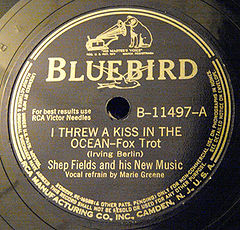Shep Fields

Photograph by William P. Gottlieb .
Shep Fields (born September 12, 1910 in Brooklyn , New York , † February 23, 1981 in Los Angeles ) was an American clarinetist, saxophonist and orchestra leader in the field of swing and popular music .
Live and act
Fields comes from Brooklyn, New York. He played the clarinet and tenor saxophone in college bands . Around 1933 he led a dance band that had an engagement at Grossinger's Catskill Resort Hotel ; In 1936 he played with his big band in Chicago's Palmer House ; the concert was broadcast on the radio. The trademark of his shows became the bubbling noise that occurs when you blow lemonade with a straw; Finally, the name for the Fields band was found at a public competition, which contained the expression "rippling", his orchestra was henceforth called Shep Fields and His Rippling Rhythm .
In 1936 he received a record contract with the Bluebird label ; Hits like "Cathedral in the Pines", "Did I Remember?", " Thanks for the Memory ", "Plenty of Money and You" were released. In 1937 Fields started a radio show called The Rippling Rhythm Revue with Bob Hope as the announcer; In 1938 he made a guest appearance at the Biltmore Hotel in Los Angeles and appeared in the feature film The Big Broadcast of 1938 . Members of his orchestra were u. a. Jack Jenney , the singer and later band leader Hal Derwin , the accordionist / composer John Serry senior and the saxophonist and later actor Sid Caesar . The high point of his career at the time was his appearance as orchestra conductor at the Academy Awards for the film The Big Broadcast of 1938 with WC Fields and Bob Hope in 1939.
Fields' orchestra was a sweet band common at the time , playing dance music for ballrooms. In 1942, however, Fields changed the sound character of the orchestra, abolished the name "Rippling Rhythm" and worked from then on with a pure woodwind section without the usual brass section. This formation, Shep Fields and His New Music with the band vocalist and later actor Ken Curtis , was not granted much success with the unfamiliar clarinet and flute sound. Fields returned to his Rippling Rhythm line-up in 1947 , which then played at the Glen Island Casino in New Rochelle and in the Ice Terrace Room of the New Yorker Hotel in 1948 ; both appearances were broadcast on the radio.
In 1953 he finally disbanded the big band and moved to Houston , Texas , where he worked as a disc jockey and occasionally performed with a band at the Shamrock Hotel . In 1963, he and his brother founded the talent agency Creative Artists in Los Angeles . In 1977 he recorded again for Reader's Digest with an orchestra. He died there at the age of seventy; Fields' grave is in Mount Hebron Cemetery in New York.
Discographic notes

- Shep Fields and His Rippling Rhythm, 1940, Volumes 1 and 2 (Hindsight)
- Shep Fields and His Rippling Rhythm (CCM, 1947)
Filmography
- You Came To My Rescue (1937) - Director: Dave Fleischer
- The Big Broadcast of 1938 (1938) - Director Mitchell Leisen , with WC Fields, Martha Raye , Dorothy Lamour and Bob Hope
- Kreisler Bandstand (1951) - TV Series (Director: Perry Lafferty)
literature
- Leo Walker: The Big Band Almanac . Ward Ritchie Press, Pasadena. 1978
- Simon, George T .: The Big Bands . With a foreword by Frank Sinatra. 3rd revised edition. New York City, New York: Macmillan Publishing Co and London: Collier Macmillan Publishers, 1974, pp. 197-200
Web links
- Shep Fields in the Bigband Database
- Shep Fields in the database of Find a Grave (English)
- Radio Archives: Shep Fields
- Shep Field at the Bigband Library
- Shep Fields at www.worldcat.org (English)
- Shep Fields in the Library of Congress online catalog catalog.loc.gov (English)
| personal data | |
|---|---|
| SURNAME | Fields, Shep |
| BRIEF DESCRIPTION | American jazz musician and big band leader |
| DATE OF BIRTH | September 12, 1910 |
| PLACE OF BIRTH | Brooklyn |
| DATE OF DEATH | February 23, 1981 |
| Place of death | los Angeles |